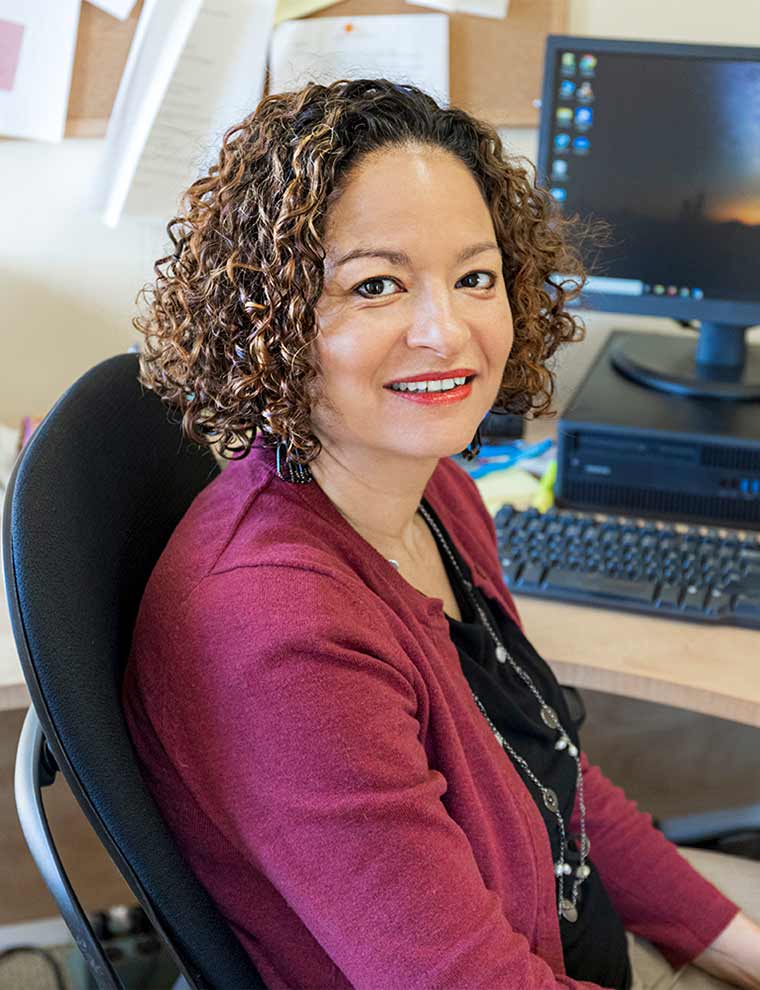Associate Dean of Studies
MA, Sarah Lawrence College. PhD, New York University. Rumph’s research and teaching interests include visual culture theory, media history, critical race theory, and gender studies. For many years, she taught media and communication studies courses at New York University and worked with students as an administrator in the areas of academic advisement and student support. She is currently a guest faculty member in the Women’s History program and an Associate Dean of Studies at SLC. SLC, 1996–
Previous Courses
MA Women’s History
Gender, Race, and Media: Historicizing Visual Culture
Graduate Seminar—Fall
What does it mean, from a historical perspective, to live in a society immersed in visual technologies? How does power figure into past and contemporary viewing practices? In this course, we will explore the field of visual culture in order to develop a critical framework through which we may understand visual perception as a set of practices that inform, and are informed by, structures of power. We will accomplish this by focusing on the rich scholarship of visual culture theory, on media and communication scholarship that foregrounds gender and racial analysis, and on the excellent scholarship that bridges media/visual studies and women’s history. We will work with a variety of mediums, including art, advertising, film, and digital media. Readings span the 19th century through the contemporary era. Nineteenth-century scholarship focuses on the rise of “commodity racism” and the production and circulation of imagery of the other within the context of industrialization, commercial advertising, and immigration. Twentieth-century topics include the development of modern/postmodern aesthetic and philosophical frameworks, the notion of the gaze, and the rise of a global media landscape. An examination of contemporary viewing practices will enable us to consider some of the implications of an increasingly fractured “mediascape” and hyperniche digital content.
Faculty
Visions/Revisions: Examining Histories of Women and Gender
Graduate Seminar—Year
This course focuses on writings about women’s history and the history of gender. We read a number of different examples of genres that engage in successful history writing: memoirs, novels, political histories, case studies, cultural histories, and biographies. These works are considered with an eye towards developing students’ abilities in several critical areas, including analyzing primary sources; developing historiographies; and applying relevant theories in the fields of women’s history and gender studies. The required readings represent a range of locations on a global scale as well as historical subjects that fall roughly within the 19th and 20th centuries with a few notable exceptions.
Faculty
Who Tells Your Story? Cultural Memory and the Mediation of History
Graduate Seminar—Spring
Media scholar Marita Sturken states that cultural memory “represents the many shifting histories and shared memories that exist between a sanctioned narrative of history and personal memory.” Sanctioned sites of remembrance, such as memorials and museums, indicate the extent to which cultural memory operates on a regional, national, and global level. As memorials are created to represent a specific point or event in history, they may also be understood as forms of media or as technologies of cultural memory that produce meanings and contain their own revealing histories. This course examines the way in which objects of historical mediation, such as memorials, have a story to tell about the politics of remembrance and forgetting. We explore how, through these objects, shifting histories collapse into one another, and how the technologies of cultural memory continue to take on renewed interest and urgency in the present. In addition to memorials, we focus on museums, documentaries, historical fiction, and the role of oral history in shaping regional and national historical narratives. We take an intersectional approach to this topic. Our time span falls roughly between the Civil War and the Civil Rights era and focuses primarily on the United States but also includes African, European, and Latin American histories of memorialization.
